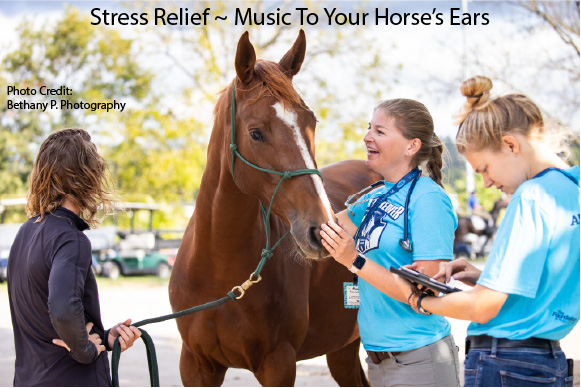Stress Relief ~ Music To Your Horse’s Ears
By Nikki Alvin-Smith

Catskill Horse magazine is always keen to spread the word about any methodologies that can help the health of the horse.
As the Editor here at Catskill Horse magazine, many press releases on the equine industry hit my inbox everyday. As a seasoned Grand Prix competitor, performance success in musical freestyles has always been a balance between what will garner attention and what fits the horse and rider. Through the delicate and challenging endeavor to find the right music for use on the equine dance floor, my eyes were up and ears alert to the sincere effect that different genres and patterns of music have on horses.
When I saw the press release from Colleen Scott, PR Supervisor at Broadhead Company, and Ginny Dunn, Animal Health Communications Specialist at Boehringer Ingelheim {BI} entitled, “At Tranquil Trot – Music Helps Reduce Stress in Horses,” I was keen to learn more than the article explained.
Before you hit the play button on the radio and blast whatever floats your boat while milling around the barn, here’s some interesting information from the experts, on the topic of how the right music can help your horse manage stress and where you can access it.
The members of this ensemble were Colleen Scott and Ginny Dunn, Sarah Reuss, VMD DACVIM and Equine Technical Manager at BI (to help us understand the veterinary science behind the work) and musician Janet Marlow.
Janet Marlow is a transplanted Brit like myself who has lived and worked in the U.S. music industry for decades. Marlow is the founder of Pet Acoustics and has spent many years researching and identifying music and its affects on animals such as cats, dogs and horses. Marlow utilizes her musical composing skills to put together sound tracks that are proven to help alleviate stress in the daily lives of these animals by ‘piping in’ repeat tunes that work on the particular species.
Marlow explained a recent study combined the use of administering body massage and playing music in a group of young racehorses to identify their response to both stimulations through measurement of their production of the homeostasis mediator, cortisol in saliva.
“When Boehringer Ingelheim expressed an interest in doing something to help manage stress in horses, I was extremely interested based on my research in this area,” said Marlow. “It’s all about composing music and modifying the decibel and frequency levels of each note for the comfortable hearing range of the animal. Using this process, we have tested music through clinical studies at veterinary hospitals, barns, etc. to see the music elicit a release of physical tensions and stress behaviors.”2
The specially designed musical track composed by sound behaviorist Marlow is called “Equine Relax-Trax” and BI have generously made it available to the public for free download via You Tube.
To access it, veterinarians and horse owners can visit https://www.youtube.com/channel/UCoekmWDxfuaOGuL1ELoPIGQ/videos. Visitors will be able to play the music track and video, as well as gain access to additional resources on stress, EGUS, and ways to help prevent it. The audio only version can be accessed at: https://equinerelaxtrax.buzzsprout.com/1835303/9061146-equine-relax-trax.
Ginny Dunn explained BI’s involvement,
“Boehringer Ingelheim is focused on helping keep horses safe and “sound” when it comes to stress with the release of a music track, called Equine Relax Trax, specially designed to help reduce stress in horses. Research shows stress can quickly turn into equine gastric ulcer syndrome (EGUS), with one study showing horses can develop stomach ulcers in as few as five days.1”

As Colleen Scott explains,
“For horses, stress is no one thing. It can include a variety of triggers, including fireworks, thunderstorms/weather, rigorous training, competitions, travel/trailering, dehydration, limited forage, changes in daily routine, isolation, new stall neighbor, illness, etc.”
But what is the scientific evidence that supports the hypothesis that certain pitches and compositions of music will reduce stress levels in horses?

Dr. Sarah Reuss explained that measurement of cortisol levels in the horse is a good indicator of its stress level or response to a trigger such as the events Scott describes. Technically speaking the adaptive processes an animal uses to protect itself by maintaining homeostasis is through the production of mediators such as adrenalin, cortisol and other chemical messengers. This process is called allostasis. Measurement of these chemical messengers in the equine body can thus yield evidence of the stress level of the horse.
“Biometric scientific studies show us that playing the right music to a horse can actually lower the level of cortisol in the horse. The higher the level of cortisol in the horse’s saliva the higher its level of stress is deemed to be. Unlike humans, horses don’t always express the level of stress they are experiencing. Take for example the therapeutic riding horse. These horses may endure a high level of stress but often do not express their angst outwardly,” explained Reuss.

According to Marlow horses along with other species have sonic memory. For humans hearing a particular song or tune can evoke an emotional response in just the same way. For example, if you’ve ever enjoyed a massage at a spa and the music playing in the background offers relaxing tones and sounds such as falling raindrops, if you hear that music outside of the spa environment it will instill relaxation by association especially if the sound is predominant in the environment.
It will also come as little surprise to many of us that certain types of music do the opposite of encouraging relaxation and instead boost our adrenalin and cortisol levels making our hearts race. The same is true of horses.
Personally I find loud rap annoying and listening to too many Rascal Flats ballads can make me sad and teary-eyed, while other songs evoke strong memories of specific events and thus reactions that are learned.
Animals exhibit sonic memory in many aspects of scientific study, perhaps most notably evidenced by the canine learned behavior in Pavlovian studies where dogs salivated without the presence of food, conditioned by the sound of a metronome.
You will likely not encounter your horse standing in the corner of his stall looking melancholy or weeping due to listening to a sound track! And it is not because he is unable to understand the emotional lyrics that may accompany the tune. But you can utilize the playing of certain tracks of music to enhance the relaxation of the horse.
I asked Dr. Reuss, whether horses were like us humans, in that certain of us have a better hearing than others and whether this would affect the anticipated positive results of piping in a loop of Relax-Trax to a variety of horses.
Mules and donkeys have bigger ears than minis and Morgans. In my experience certain horses are more affected by loud noise than others. My understanding is that this may be due to previous exposure to viruses that have accentuated their hearing or due to individual genetic physiologic factors.
“All Equus have similar acoustic physiology regardless of the size of their ears,” Reuss explained, “So the benefits of Relax-Trax, given it is the predominant sound in their environmental bubble, should be equally enjoyed by all types of
Equus.”
Dr. Reuss also explained that she would be attending the recently held event,
the Retired Racehorse Project’s Thoroughbred Makeover and National Symposium, presented by Thoroughbred Charities of America on October 12-17, 2021, at the Kentucky Horse Park, Lexington, KY, as part of the veterinary team, where she would be utilizing a portable speaker system during the vet exams to play the Relax-Trax to the 400 horses present to further assess its potential benefits.

While I’m not certain that listening to the same music track repeated time over time in the stables might not elevate my stress level, it will be interesting to see more studies on this topic hopefully evolve over time and to learn how we can better help our horses manage stress. Certainly Janet Marlow would be a leading resource for such studies, with her extensive background and experience on the musical side of the aisle combined with her sound behavioral studies.
There is no question that any relief that can be provided to horses in our care in regard to stress can mitigate the damage that stress can cause to their health. Stress increases muscle tension that in turn increases the likelihood of injury and/or lameness, it can generate behavioral changes and bad habits and internal manifestations of stress such as ulcers can cause acute pain. All the above affect the horse’s daily life and will negatively affect its performance.

1: McClure SR, Carithers DS, Gross SJ, Murray MJ. Gastric ulcer development in horses in a simulated show or training environment. J Am Vet Med Assoc 2005;227(5):775-777.
2: Kędzierski, W., Janczarek, I., Stachurska, A., & Wilk, I. (2017). Massage or music meant to be relaxing, result in lowering salivary cortisol concentration in race horses. Pferdeheilkunde Equine Medicine, 33(2), 146–151.


